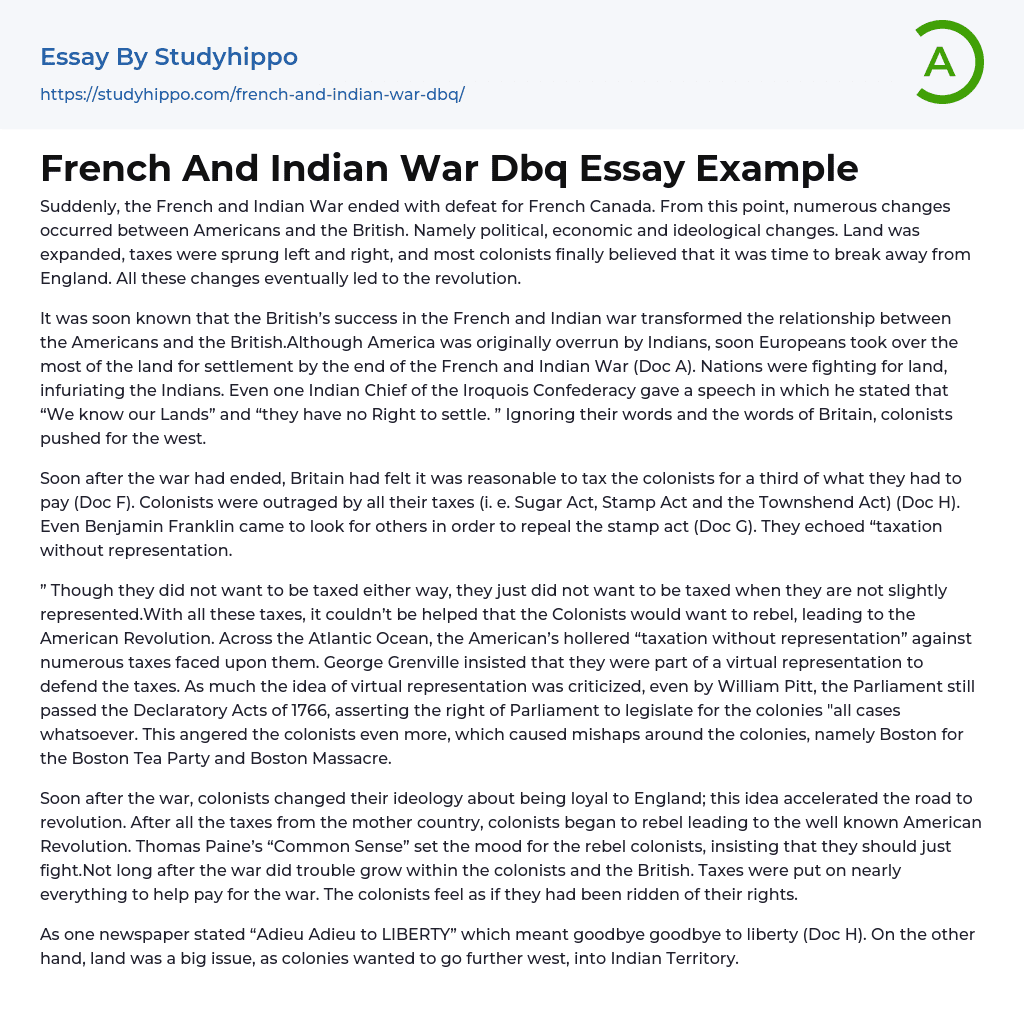Suddenly, the French and Indian War ended with defeat for French Canada. From this point, numerous changes occurred between Americans and the British. Namely political, economic and ideological changes. Land was expanded, taxes were sprung left and right, and most colonists finally believed that it was time to break away from England. All these changes eventually led to the revolution.
It was soon known that the British’s success in the French and Indian war transformed the relationship between the Americans and the British.Although America was originally overrun by Indians, soon Europeans took over the most of the land for settlement by the end of the French and Indian War (Doc A). Nations were fighting for land, infuriating the Indians. Even one Indian Chief of the Iroquois Confederacy gave a speech
...in which he stated that “We know our Lands” and “they have no Right to settle. ” Ignoring their words and the words of Britain, colonists pushed for the west.
Soon after the war had ended, Britain had felt it was reasonable to tax the colonists for a third of what they had to pay (Doc F). Colonists were outraged by all their taxes (i. e. Sugar Act, Stamp Act and the Townshend Act) (Doc H). Even Benjamin Franklin came to look for others in order to repeal the stamp act (Doc G). They echoed “taxation without representation.
” Though they did not want to be taxed either way, they just did not want to be taxed when they are not slightly represented.With all these taxes, it couldn’t be helped that the Colonists would want to rebel, leading to the American Revolution. Across the Atlantic Ocean
the American’s hollered “taxation without representation” against numerous taxes faced upon them. George Grenville insisted that they were part of a virtual representation to defend the taxes. As much the idea of virtual representation was criticized, even by William Pitt, the Parliament still passed the Declaratory Acts of 1766, asserting the right of Parliament to legislate for the colonies "all cases whatsoever. This angered the colonists even more, which caused mishaps around the colonies, namely Boston for the Boston Tea Party and Boston Massacre.
Soon after the war, colonists changed their ideology about being loyal to England; this idea accelerated the road to revolution. After all the taxes from the mother country, colonists began to rebel leading to the well known American Revolution. Thomas Paine’s “Common Sense” set the mood for the rebel colonists, insisting that they should just fight.Not long after the war did trouble grow within the colonists and the British. Taxes were put on nearly everything to help pay for the war. The colonists feel as if they had been ridden of their rights.
As one newspaper stated “Adieu Adieu to LIBERTY” which meant goodbye goodbye to liberty (Doc H). On the other hand, land was a big issue, as colonies wanted to go further west, into Indian Territory. With all these restless disputes, the American Revolution was just around the corner.
- Victorian Era essays
- Henry v essays
- Stonehenge essays
- Federal government essays
- Armed Forces essays
- Confederate States Of America essays
- Federal Government Of The United States essays
- Fourteenth Amendment To The United States Constitution essays
- Governance essays
- Parliament essays
- Politics essays
- Jurisdiction essays
- Bureaucracy essays
- Separation Of Powers essays
- Congress essays
- President essays
- United States Congress essays
- Non-Commissioned Officer essays
- Appeal essays
- Revenge essays
- Corporate Governance essays
- Public Service essays
- Income Tax essays
- Supply essays
- Red Cross essays
- Democracy essays
- State essays
- Liberty essays
- Absolutism essays
- Reform essays
- Republic essays
- John Marshall essays
- Bourgeoisie essays
- Developed Country essays
- Elections essays
- International Relations essays
- Left-Wing Politics essays
- Monarchy essays
- Political Corruption essays
- Political Party essays
- Political Science essays
- Sovereign State essays
- United Nations essays
- World Trade Organization essays
- Contras essays
- Dictatorship essays
- Foreign policy essays
- Monarch essays
- Corruption essays
- Foreign essays




